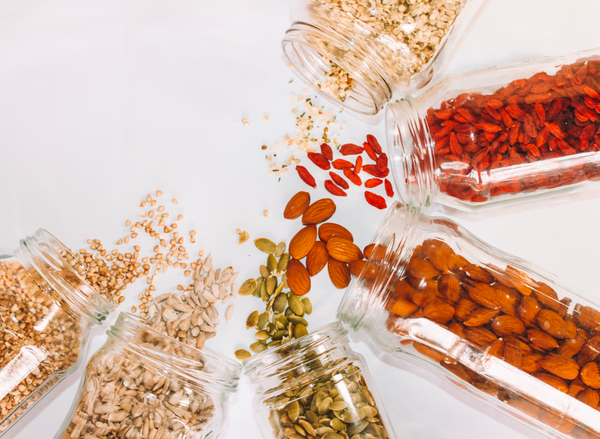Stress, simply defined, means the body is out of balance. We all have a baseline, a place of homeostasis our body likes to land. Stress tips the body out of balance, activating a cascade of events, similar to a game of Dominos. Stressors come in all shapes and sizes: work deadlines, relationship problems, family pressures, or illness. As the body responds to stress, one of the key domino pieces commonly ignored is micronutrient needs.
Stress and nutrient deficiencies have a bidirectional relationship - stress can cause micronutrient deficiencies and existing deficiencies can exacerbate stress. Because the two go hand in hand, it's important to understand how stress impacts the nutritional status of your body and learn what you can do to meet your unique needs.
First, let's go over how stress can cause micronutrient deficiencies.
Stress and Nutritional Deficiencies
Stress triggers the FIGHT OR FLIGHT branch of your nervous system called the sympathetic nervous system.
Here, the domino pieces involved include the hypothalamus and pituitary gland in the brain along with the adrenal glands that sit on top of your kidneys. When responding to stress, the adrenal glands produce large amounts of two stress hormones, cortisol and adrenaline, that are released into the bloodstream, resulting in side effects like increased blood pressure and heart rate, digestive problems, trouble sleeping and concentrating, and feeling tense or irritable -- to name a few.
This stress response can cause nutrient deficiencies for 3 main reasons:
- Increased micronutrient demands
- Decreased micronutrient absorption
- Changes in eating behaviors
Micronutrient Depletion
1. Increased Demands
Stress puts our bodies into overdrive - immediately increasing blood pressure and heart rate to pump extra blood, oxygen, and nutrients to our muscles and vital organs. This is helpful in an acute stress situation, but with chronic stress, it quickly depletes vitamins and minerals used in these pathways, especially magnesium, B vitamins, vitamin C, and iron [2].
A few specific examples of increased micronutrient needs include:
- The adrenal glands requiring more vitamin C to function properly and produce stress hormones like cortisol and adrenaline.
- Higher amounts of magnesium are needed to counteract the stress response via calming actions of neurotransmitters like GABA[6].
- B vitamins function as cofactors or helpers to produce larger amounts of neurotransmitters under stress along with supporting metabolic pathways that utilize fats, carbs and protein as an energy source.
2. Decreased Absorption
The second way stress impacts nutrient status is by altering digestion and absorption in the gastrointestinal tract. During the stress response, the adrenal glands release cortisol and adrenaline, which diverts energy and blood flow away from the digestive tract which can negatively impact nutrient absorption [3].
New research shows stress decreases gastric secretions, lowering the amount of stomach acid, pancreatic enzymes, and bile required to break down food [4]. This causes another domino effect that further impairs digestion and decreases the volume of nutrients absorbed, especially related to micronutrients that require a certain amount of stomach acid for proper absorption such as zinc, folate, vitamin B12, and iron.
Excessive adrenaline in the intestinal tract can lead to fast motility (causing diarrhea) and a loss of nutrients. Chronically high cortisol and adrenaline can lead to a condition commonly known as “leaky gut” where tight junctions between intestinal cells open up and cause micronutrient malabsorption, inflammation, and increased risk of food sensitivities.
3. Changing Eating Behaviors
The third way stress can impact nutritional status is by changing our eating behaviors.
Making unhealthy food choices
Food cravings for sweet and high-fat foods are common when stressed due to those foods’ ability to provide a short-lived, mood-boosting effect. This effect is translated into that “Ah, I feel better” stress relief by the brain. These foods - cookies, crackers, chips - are typically void of micronutrients while loaded with inflammatory chemicals, refined sugars, and fats that harm long-term health and increase the need for antioxidants.
Additionally, increased alcohol and caffeine consumption is more common amidst stress. Both beverages dehydrate the body and can lead to the excretion of excessive vitamins and minerals.
Irregular eating patterns
Eating patterns can also be affected by stress. The initial surges of the hormone epinephrine, secreted in response to stress, can decrease appetite. This can lead to skipping meals, which may cause you to miss out on key nutrients.
Additionally, cortisol taps into protein stores and causes glucose, our body's primary source of fuel, to flood into the bloodstream. For a short-term stressor, this is helpful because muscles and vital organs have quick fuel at their disposal. But continually elevated cortisol levels lead to continually elevated blood glucose, high blood sugar, and lean muscle loss. High blood sugar is linked with diabetes, visceral fat accumulation ( fat that forms around organs), insulin resistance, and other serious health effects.
Micronutrient status and stress levels

Now that we know how stress can affect micronutrient levels, let's look at the role different nutrients have on the stress response.
The nutrients most heavily involved are magnesium, vitamin B6, vitamin C, vitamin D, iron, and zinc.
Magnesium

Did you know that your need for magnesium can DOUBLE under stress? Ever notice your eye twitching, your heart palpitating, or feel like you have to jump out of bed with a Charlie horse in your leg? These are all signs that you may have suboptimal magnesium levels. The link between magnesium status and stress is well established.
The "magnesium and stress vicious circle concept" refers to a popular idea that stress increases magnesium loss and magnesium deficiency enhances susceptibility to stress [6]. It does this by inhibiting adrenaline, supporting neurotransmitter synthesis, and interacting with the HPA axis.
Inhibiting adrenaline
Magnesium plays a key role in regulating epinephrine (adrenaline). This is because magnesium can inhibit a class of chemicals called "catecholamines". Epinephrine (adrenaline), a key stress hormone, is classified as a catecholamine.
Supporting neurotransmitter synthesis
Magnesium supports the production of GABA, an important neurotransmitter thought to regulate stress and anxiety. It also plays a role in serotonin and dopamine activity, which impacts your mental health.
Modulating the HPA Axis
Magnesium has also been shown to affect the HPA axis [7]. The HPA axis, comprised of the hypothalamus, pituitary gland, and adrenal glands, is responsible for sustaining the stress response. It secretes corticotropin-releasing hormone (CRH), which triggers the release of adrenocorticotropic hormone (ACTH). ACTH then triggers the release of cortisol.
In clinical studies, magnesium restrictions have been shown to increase the activity of CRH and ACTH - leading to increased signaling of cortisol.
To further support its role in stress response, multiple studies examining psychological stress and anxiety commonly find low magnesium status in participants [6].
B Vitamins

There are eight B vitamins (B1, B2, B3, B5, B6, B7, B9, and B12) that operate together like a family and play a vital role in energy production and the body’s response to stress. Since they're water-soluble, they're excreted out daily via urine, so we must replenish them every day.
Vitamin B6 has many roles that are relevant to the stress response, including immune system function (antibody production), balancing blood sugars, making neurotransmitters (GABA, serotonin, dopamine) for mood regulation, and oxygen transport via hemoglobin production.
Randomized control trial studies have demonstrated vitamin B6 as an effective tool to improve anxiety and depression symptoms in stressed, healthy adults. Inadequate intake of vitamin B6 was shown to increase the risk of anxiety and depression in 3,000 adults. B6 works synergistically with magnesium and may enhance the absorption and effects of magnesium.
Another key role of B6 is the regulation of the amino acid, homocysteine.
Homocysteine
Homocysteine is an amino acid in your body that works alongside vitamin B6, B9, B12 and zinc to make neurotransmitters, antioxidants, DNA and more. If there are blocks in this pathway, homocysteine can build up in the bloodstream and act like sandpaper to your blood vessels causing inflammation and damage to your body - both of which lead to fatigue and additional stress on the body. It is important to keep homocysteine in balance with proper micronutrients and a healthy lifestyle.
Vitamin C

Vitamin C functions as an antioxidant, reducing the amount of free radicals that lead to inflammation and tissue damage - an important function during times of stress. The adrenal glands require vitamin C to function properly and this key nutrient can become depleted quickly when physically ill or mentally stressed out.
Studies have shown getting adequate amounts of vitamin C can:
- lower stress hormones in the blood
- improve sense of well-being via dopamine production
- aid in weight loss
- improve the health of the adrenal glands
- Improve immune system
Vitamin C deficiency is widely associated with stress-related conditions. Both human and animal studies show a deficiency in vitamin C causes the body to secrete cortisol [9], which further stimulates a stress response.
Vitamin D

Vitamin D is made by the body using UV (sun) light to convert cholesterol into vitamin D. Because many people's primary source is the sun and the majority of modern life is lived indoors, it's one of the most prevalent vitamin deficiencies.
One way vitamin D and stress are associated is because vitamin D and cortisol share the same receptor. So when you're stressed and cortisol is high, vitamin D cannot be utilized. High cortisol coupled with inhibited vitamin D uptake can worsen stress levels.
Vitamin D is also important for the nervous system because it plays a "neuroprotective" role in the brain - an increasing amount of data links vitamin D deficiency with stress, anxiety, and depressive symptoms [10].
Iron

Stressful situations can alter iron concentration in the body. A well-known example of this was a study conducted on Navy Seal trainees. After 5 days of physical and psychological stress, blood iron concentrations decreased by 44% [2].
This may be because excessive stress hinders the production of hydrochloric acid (HCl), which is the acid in the stomach that breaks down food. Without enough HCl, iron absorption is impaired.
Zinc

Zinc is an essential trace mineral important for wound healing, immune function, and DNA synthesis. It's also important in stress management: it helps mitigate the effects of stress by inhibiting the secretion of cortisol.
Many studies show chronic stress exposure depletes zinc stores in the blood [2]. This leads to zinc deficiency, which has been shown to increase cortisol and pro-inflammatory signaling.
Study example
Here's a real-life example demonstrating the importance of micronutrients on overall well-being and stress management.
Following a traumatic earthquake in the UK, researchers began a 4-week study on 91 earthquake survivors, testing the effects of micronutrient supplementation on their distress levels.
Results showed stress, trauma, anxiety, and depression markedly improved across the 3 groups of earthquake survivors who took daily doses of micronutrients. The control group that didn't take a vitamin and mineral supplement showed little improvement [5].
How to improve micronutrient status
Due to the complex nature of how stress impacts not only micronutrient demands but also absorption as well, it’s important to take a comprehensive approach to proper intake and absorption and prioritize nutrient-rich food choices.
Here are some simple ways to improve your nutrient status in the face of chronic stress.
- Try to get 7-9 hours of quality sleep per night. This helps lower stress hormones and increases repair and healing of your GI tract for improved micronutrient absorption.
- Eat a nutrient-rich, whole foods diet. This will deliver essential nutrients to your body and mitigate blood sugar swings that occur easily when stressed.
- Practice stress-reducing techniques such as meditation and breathing exercises. Lower stress hormones will improve micronutrient absorption, decrease micronutrient loss and assist in making better food choices.
- Consider micronutrient testing. Test, don’t guess. While symptoms can help guide you, knowing your micronutrient levels is key. This will highlight suboptimal nutrient levels that are impacting your health.
- Incorporate vitamin and mineral supplements. This is a simple way to prevent nutrient deficiencies and replenish nutrients depleted by stress.
Rootine

With science proving how stress impacts micronutrient status, knowing the levels of nutrients in your body is key to optimizing your health. Rootine considers your unique DNA, blood, and lifestyle data when formulating your micronutrient formula.
The blood mineral and blood vitamin test shows your body's current levels of 12+ nutrients and inflammation markers and uses the data to customize a multivitamin dose for you. Your precision multivitamin includes all the nutrients listed above to support a healthy stress response.
Sources
- Kilburn, M. (2020, December 10). What nutrients are depleted by stress? A.Vogel Herbal Remedies. Retrieved July 27, 2022, from https://www.avogel.co.uk/health/stress-anxiety-low-mood/stress/what-nutrients-are-depleted-by-stress/
- Lopresti, A. L. (2020, January 1). The effects of psychological and environmental stress on micronutrient concentrations in the body: A review of the evidence. Advances in nutrition (Bethesda, Md.). Retrieved July 27, 2022, from https://www.ncbi.nlm.nih.gov/pmc/articles/PMC7442351/
- Stress and health. The Nutrition Source. (2021, January 15). Retrieved July 27, 2022, from https://www.hsph.harvard.edu/nutritionsource/stress-and-health/
- Esplugues, J. V., Barrachina, M. D., Beltrán, B., Calatayud, S., Whittle, B. J., & Moncada, S. (1996, December 10). Inhibition of gastric acid secretion by stress: A protective reflex mediated by cerebral nitric oxide. Proceedings of the National Academy of Sciences of the United States of America. Retrieved July 28, 2022, from https://www.ncbi.nlm.nih.gov/pmc/articles/PMC26223/
- Rucklidge JJ;Andridge R;Gorman B;Blampied N;Gordon H;Boggis A; (2012). Shaken but unstirred? effects of micronutrients on stress and trauma after an earthquake: RCT evidence comparing formulas and doses. Human psychopharmacology. Retrieved July 28, 2022, from https://pubmed.ncbi.nlm.nih.gov/22782571/
- Pickering, G., Mazur, A., Trousselard, M., Bienkowski, P., Yaltsewa, N., Amessou, M., Noah, L., & Pouteau, E. (2020, November 28). Magnesium status and stress: The Vicious Circle Concept revisited. Nutrients. Retrieved July 28, 2022, from https://www.ncbi.nlm.nih.gov/pmc/articles/PMC7761127/
- Sartori, S. B., Whittle, N., Hetzenauer, A., & Singewald, N. (2012, January). Magnesium deficiency induces anxiety and HPA axis dysregulation: Modulation by therapeutic drug treatment. Neuropharmacology. Retrieved July 28, 2022, from https://www.ncbi.nlm.nih.gov/pmc/articles/PMC3198864/
- Stough, C., Simpson, T., Lomas, J., McPhee, G., Billings, C., Myers, S., Oliver, C., & Downey, L. A. (2014, December 22). Reducing occupational stress with a B-vitamin focussed intervention: A randomized clinical trial: Study protocol. Nutrition journal. Retrieved July 28, 2022, from https://www.ncbi.nlm.nih.gov/pmc/articles/PMC4290459/
- ScienceDaily. (1999, August 23). Scientists say vitamin C may alleviate the body's response to stress. ScienceDaily. Retrieved July 28, 2022, from https://www.sciencedaily.com/releases/1999/08/990823072615.htm
- Kelley, L., Sanders, A. F. P., & Beaton, E. A. (2016, December). Vitamin D deficiency, behavioral atypicality, anxiety and depression in children with chromosome 22q11.2 deletion syndrome. Journal of developmental origins of health and disease. Retrieved July 28, 2022, from https://www.ncbi.nlm.nih.gov/pmc/articles/PMC5922262/



